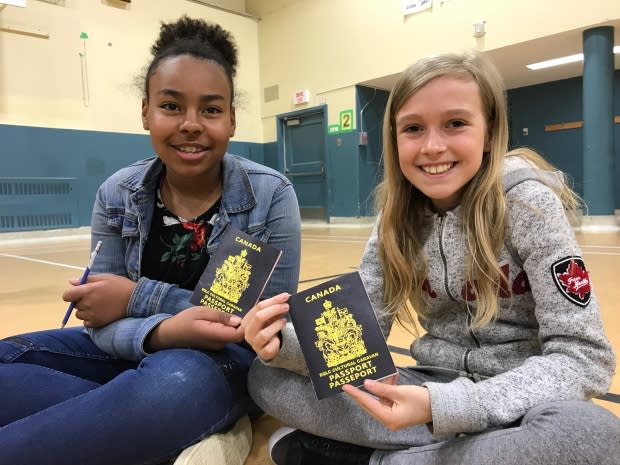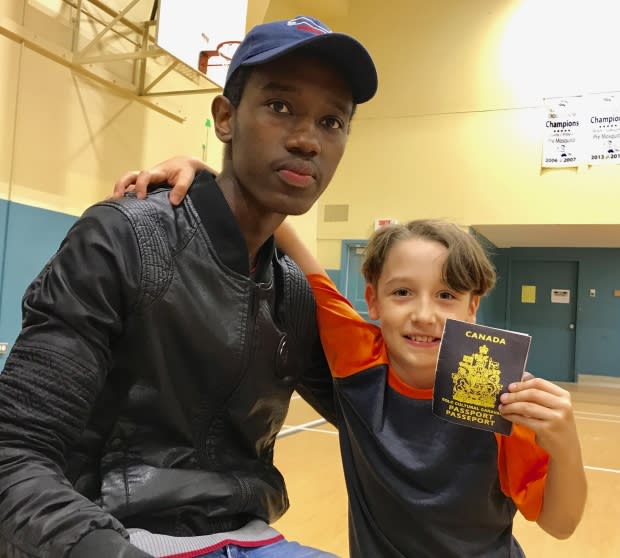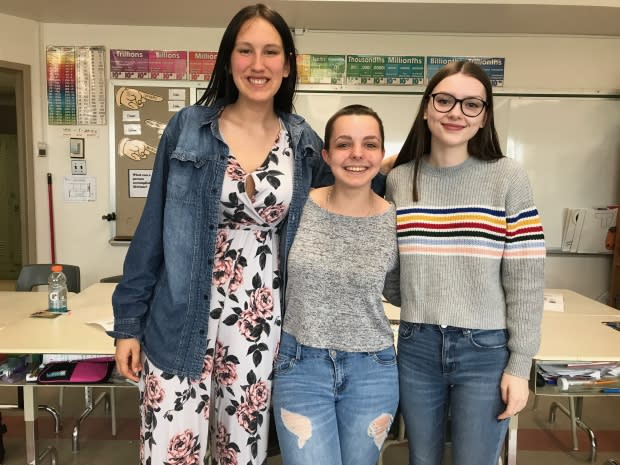Congolese dance, Ugandan fashion and Chilean sports showcased at Quebec City school
All day long, Alexandra Roach and Alexiane Augustin, Grade 5 and 6 students at Everest Elementary School in Quebec City, diligently took notes in their passports as they learned new facts about countries like Afghanistan, Chile, Rwanda and Uganda.
They were learning directly from the source: older students who once called those countries home.
The older students were part of a "cultural caravan" created to highlight and bring awareness to some of the cultures present in Quebec City, many of which are not represented in the local schools. The caravan takes the form of classroom workshops, storytelling and dance lessons.
Seven people from five different countries, all currently studying at the Eastern Quebec Learning Centre, were enlisted as the caravan's "tour guides."
They range in age from 18 to 25. Some have been living in Quebec City for a decade, while others are more recent immigrants.
Ugandan-born Zawadi Uhuru, who's been living in Quebec City for four years, said she jumps at any opportunity to meet new people.
She chose some of her favourite clothes, sewn from bold and colourful African fabrics, as well as beaded jewellery to represent her native country.

"We love to wear shouting colours in Africa," she said. "At school, I normally wear shouting colours and people say, 'Hey Zawadi! This is too much!' but I say, 'Oh I love it.'"
When it comes to sharing details about her home country with young, curious students, she is happy to help them unlearn some stereotypes.
"Some of them, they don't know that Africa is a continent," Uhuru said.
Forging friendships
Not all of the cultural caravan tour guides are as extroverted as Uhuru.
Eighteen-year-old Roger Sharom, who recently immigrated from Rwanda, was initially reluctant — nervous about speaking in front of a crowd of young students.
He ended up relishing the experience.
"I shared the tragic event which happened in Rwanda back in 1994, and I could see their hearts were breaking, but they were open," he said. "It was absolutely magical."
"What surprised me is how they turned out to be my best friends."

The idea for these educational exchanges came from a group of Secondary V students at Quebec High School who were enrolled in a leadership class.
They were struck by the diversity they see in certain Quebec City neighbourhoods, noting that it wasn't reflected in the city's English-language schools.
"We don't see as much diversity as you would in French schools because of Bill 101," Laurence Jobin said.
"We thought it would be important for children, especially in English schools, to learn about the different cultures — not only around the world but also in Quebec."

Mia Tenasco, who is a member of the Kitigan Zibi Anishnabeg First Nation, said her own experience and identity had a direct impact on how she and her fellow students structured the cultural caravan.
"People who come from different places, even within Canada, sometimes have a hard time to integrate into society," she said.
Exposure to diversity
It was great to see students as young as eight meeting people from different countries, Tenasco said.
"Ignorance is a very strong and powerful thing.... I think for the minority groups living here in Quebec City, it's very important that they get to be accepted here ... to be able to live freely."
The day's events culminated in a big group dance lesson from Congolese dancers.
The music blaring from the speakers got students laughing, jumping and hopping around the gym as they were guided by their new friends.
"Everything about today was awesome," Antoine Anger, nine, shouted over the music.
Fighting intolerance
Tenasco says this kind of connection is of added importance in the wake of the deadly attack at the Quebec City mosque on January 29, 2017.
"It's important that we accept [newcomers] with open arms and that they feel comfortable and they feel like they could integrate calmly and comfortably into our society," she said.
"Right now it's up to the younger generation to kind of break the cycle of hate and ... make sure that people are accepted for who they are."
The team hopes to bring the cultural caravan to more schools across the city in the coming months.


